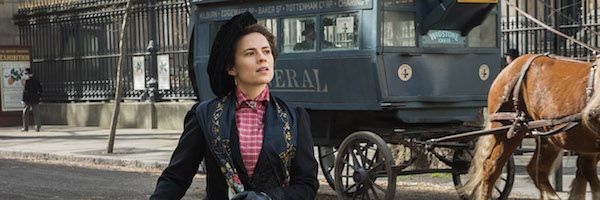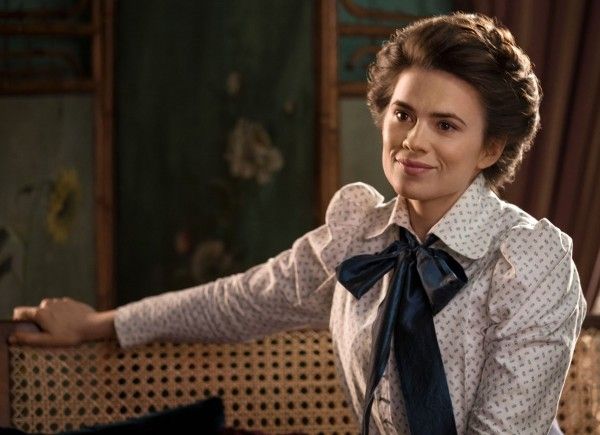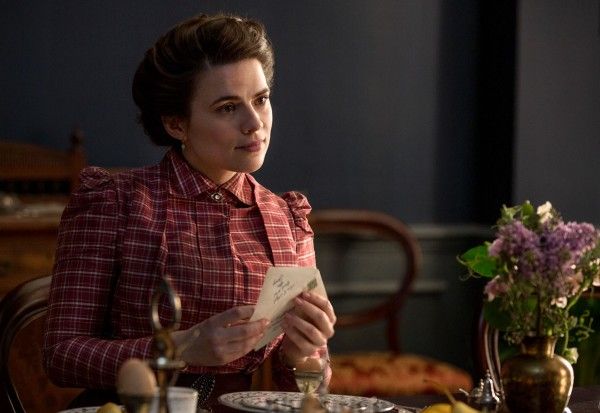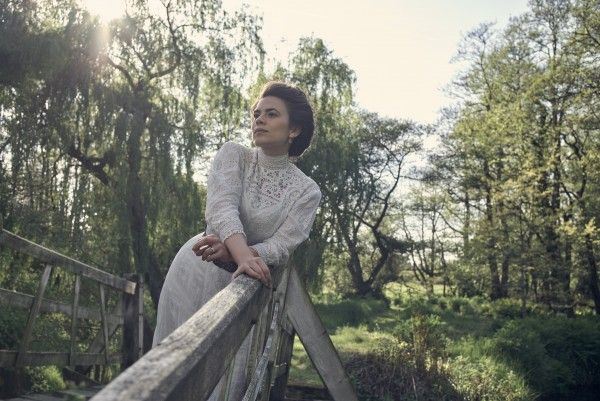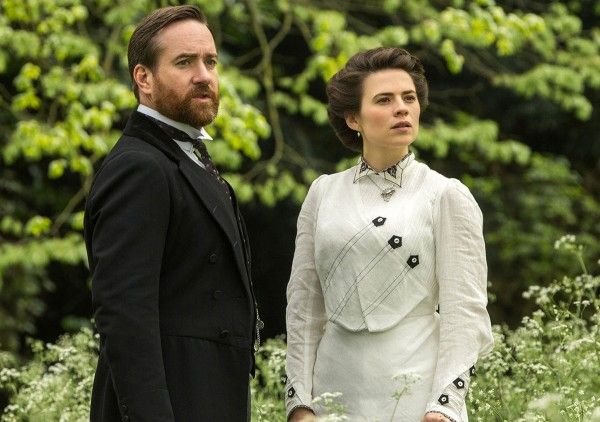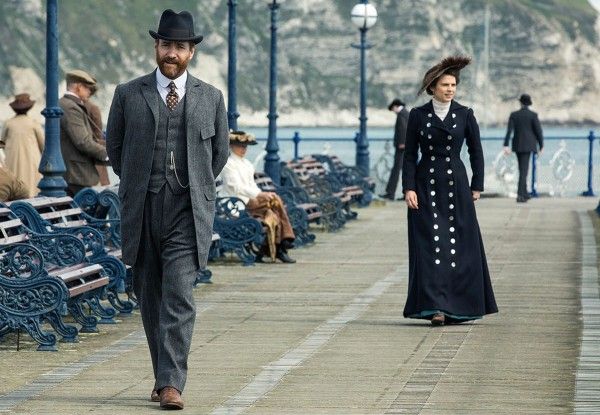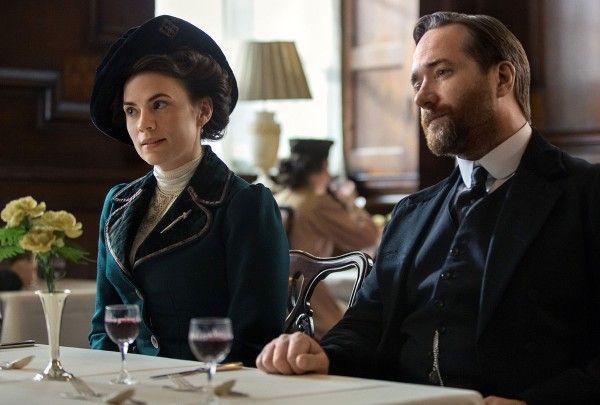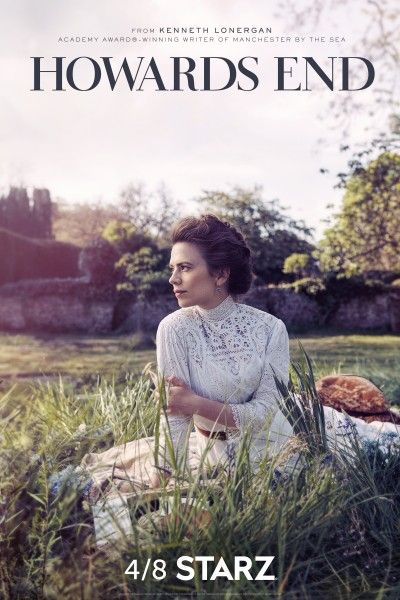Adapted from the E.M. Forster novel, written by Kenneth Lonergan and directed by Hettie Macdonald, Howards End (airing on Starz in four installments) is the story of two independent and unconventional sisters, Margaret (Hayley Atwell) and Helen Schlegel (Philippa Coulthard), trying to discover meaning in an ever-changing world. When Ruth Wilcox (Julia Ormond) dies unexpectedly, her husband Henry (Matthew Macfadyen) becomes the owner of Howards End and Margaret finds that he may be much more than she ever expected.
During this 1-on-1 interview with Collider, actress Hayley Atwell talked about why she wanted to sign on for this re-telling of Howards End, what most appealed to her about the script, the advice she got from Emma Thompson, who played Margaret in the 1992 feature film, what she most enjoyed about playing this character, how other people in her life view her, the relationship between Margaret and Henry, why she’d think a lot harder about doing a network episodic TV series again, and what it meant to her to play Peggy Carter, with the fan reaction to that character.
Collider: I loved the Howards End film. What was your history with the novel and the movie, prior to doing this?
HAYLEY ATWELL: Em (Emma Thompson) is a very good friend of mine, so I called her up and she said, “Don’t watch the movie!” I’d seen the movie and I remembered specific things about it because it’s such an extraordinary performance, and she went, “You are she, and she is you. Don’t do that!” It was very, very generous of her to say that. And I knew that (author) E. M. Forster was on the outskirts Bloomsbury set. He wasn’t a full-on bohemian, and I think you can see that within the characters of Margaret and Helen. They are intellectuals and they are artistic, but they’re not bohemian, in the sense that there is anything worthy about being poverty-striken and hedonistic. They weren’t hedonistic. That’s all I knew.
And I had just recently seen Manchester by the Sea and I knew Kenny Lonergan’s work from before. The big selling point for me was knowing that he had adapted it. I thought that was really smart. The danger with any kind of television period drama is that they can be very mannered, rigid, lacking in humor, inaccessible, and irrelevant to modern-day. But when they are done well, they’re fantastic because a lot of it stems from really good literary writing and stories that are character-driven. When they’re done well, they’re really great. I felt that, with Kenny, he’s not reverential about this material. In fact, every reason he gave Colin Callender, as to why he didn’t think he should adapt it, Colin’s response was, “All those reasons are exactly why you should, which was great.”
A lot of the scripts had lots of overlap of characters. There were eight-page scenes with five different characters, overlapping to respond, and they’re just doing that, the whole time. That creates a lightness of touch and a comedy, and it’s how people speak. People who know each other finish each other’s sentences and pre-empt what you’re gonna say. Immediately, for me, it lifted it off the page and demystified it. That’s what we set out to do, and I felt that that’s what was in the script, as well. I felt very safe that we weren’t gonna do something that was a bit uptight and pretentious.
And you knew all of that, before signing on then?
ATWELL: Yeah, they sent me the script beforehand. I wouldn’t have done it, otherwise. That’s the thing about adaptations. Unlike formulaic episodic network TV shows that are writing the scripts, as they go along, and you don’t know what you’re gonna get, which means you don’t have any control over the lines that you say, the reason why I love film, and more so love plays and adaptations of literary classics, is that the material has weight to it and gravitas. It becomes the core and soul of what you’re doing and, as an actor, you get to make lots of different choices about how to interpret that text and how to say a particular line and how to inflect. The better the quality of the writing, the more freedom I find, as an actor, to make certain choices. For me, that’s the kind of work I love doing.
Because you’ve done episodic TV, would you have to think a lot harder about doing one again?
ATWELL: Yeah. There is such a churning out and there is so much content and repetition of content, following particular formulas, that for me, it becomes fast food television. It becomes a numbing thing to do, when you’re sitting at home and eating pizza. There’s a huge market for it, and that’s really cool, and there are some moments in there where they’re absolutely brilliant and ground-breaking, like Breaking Bad or The Sopranos or The West Wing, and the content is so great, but they’re very, very rare to come to. Something can start off with a particular premise and fantastic people at the helm of it, but because it’s being created as you go along and it’s being essentially controlled by the network, it’s very hard, as an actor, to not feel like you’re a pawn in something. There are people who are brilliant at it and love it and find it fulfilling, but given the fact of where I come from and what my natural interests are, and the work that interests me and that I like to watch, it’s just a different things.
Did Agent Carter feel a bit different from that?
ATWELL: It felt, creatively, that it came from Marvel. It was created as a spin-off because my interpretation of her in the film was popular and they wanted to see more of her, so I felt like I got to collaborate and that Peggy was something that we all did together. It grew, naturally. Although that was on network television, it did feel very much like a Marvel thing, keeping with the mythology of who she is and the heart of who she is, so that did feel slightly different. I’m learning about the context of knowing your audience and knowing what things are intended to do, in the genre that they’re set in and, within that, whether they succeed in their genre. Any job that I do now, I’m learning to understand who the audience is and what the tone of the piece is, and am letting it be defined, based on what it is and what it sets out to do.
What did it mean to you to play a character like Peggy Carter, that so many fans have loved so much?
ATWELL: I know the fans love her, and that’s really lovely. She lives in the imaginations of a lot of people. She doesn’t live in mine. It’s an acting job that I enjoyed. It was just really fun. I love the fact that it had a positive impact on people. I’ve met people at conventions and they’ve said, “This is my daughter, Peggy” or “This is my son, Carter” or “This is a tattoo of your face on my arm.” That’s committed, and that’s really lovely. It’s always very humbling and very moving to hear that a character or a story that you’ve been a part of has moved someone, in some way. I grew up watching actors and characters and, if I’d gotten the chance to tell them, in person, what they meant to me, then it was a really wonderful thing. That’s great!
Similarly, what did you most enjoy about playing Margaret Schlegel?
ATWELL: What I love about Margaret is that she’s very intelligent. It’s a character-driven piece. Thought by thought, line by line, she’s forging her own identity, navigating her way through this world, which is very, very relevant to today, as a woman figuring out how does one live within one’s means? How do we create meaningful relationships? Do we settle? Where do we compromise? What do the choices that we make about the way that we want to live affect people that we love? You see her, line by line and though by thought, navigating her way through this extraordinary, complex world, and it’s really moving and really beautiful. Margaret was such a different challenge because she’s so unlike me that I had to move beyond my own personality and go outside of my comfort zone, in playing her. She’s so much more intelligent than me, and she’s so much more compassionate and emotionally articulate than I am, that I had to go to her. When the material is so much greater than one’s self, you have to grow into it and you have to work really hard to try to honor it. I had to expand and that, for me, felt very thrilling. It was a different kind of challenge that was very, very stimulating.
Margaret is a women not like other women. How do other people react to her?
ATWELL: I talked to Emma about that and she said, “In preparation, maybe you should read some physics textbooks.” Margaret has such an active mind, with her logic and analytical skills, as well as her appreciation for the arts. Academia is so amazing, and a lot of it would have been self-taught because she wouldn’t have been educated. Unlike her younger brother, who goes to Oxford, she couldn’t go to Oxford, and yet she probably would have thrived, if she was able to have that kind of education. Everything is self-taught for her, really. I didn’t find that intimidating. I found that really exciting.
Same thing with being around Emma Thompson’s intelligence, which reminds me of Margaret. It’s contagious. It’s not condescending or patronizing or superior. There’s a real desire to want to open your mind and have a genuine thrilling conversation, and by the end of it, you feel slightly changed, in some way, or you feel that your perception of the world is altered slightly. You feel that you’re slightly more liberated and free, from the limited way that we view the world, day to day. I found that with Margaret, as well. She was always ten steps ahead of me, and that was fine. I just had to work really hard to make sure that my thoughts were coming out quick enough. I didn’t have to be her, all the time. I could take breaks.
How are you approaching the relationship between Margaret and Henry?
ATWELL: Matthew [Macfadyen] is so good in this. He’s such an intelligent and sensitive actor, and so funny. This is my third time working with him, so that was great. That only helped. We trusted each other, knew how the other works, and were able to have fun doing it. What’s remarkable about Margaret, and she says it in her defense of choosing to be with Henry, is that she knows parts of him better than he knows himself. She would argue that he’s not necessarily as morally sound as she is, or as emotionally articulate. He may have focused on many things in the world that he’s good at, but that are of no use for anything other than his own personal gain. She’s aware of all of that, and yet she still sees something in him. She sees a man that has been able to take action. She’s there with all of her books and finds it hypocritical that she knows about social reform, but doesn’t really do anything about it. She sits at lunches discussing her charity work, but she doesn’t do anything about it. He’s out there going, “I know I’m a businessman, and I’m a capitalist, and I’m an industrialist, and I’m materialistic, but by default, I’m actually employing hundreds of the people you sit around talking about raising money for.”
He takes the sentimentality out if it, and he takes the romance and idealism out of it, and that’s really exciting for Margaret. She goes, “Oh, maybe I was wrong about writing off people like him as materialistic capitalists who are out for their own gains. Actually, look what they’re doing.” I think she likes the contribution he’s making to the world. She knows who he is and the limitations of who he is, but she’s not going to take his raw materials and shape him into something she feels she wants. She knows where she begins and he ends, and she knows how to have a relationship with him that is about connection, about tolerance, and about accepting who he is, without that threatening her own value system. That’s really mature and really an amazing idea, and quite special and evolved for now, let alone for 1906. That connection and that love and that desire for meaningful relationships is the narrative. That’s what the story is. Aside from the backdrop of the period and the plot, which is great, it’s essentially about human relationships. It’s very moving, very warm, and very funny, and it was a really special experience, for all of us.
Howards End airs on Sunday nights on Starz.

